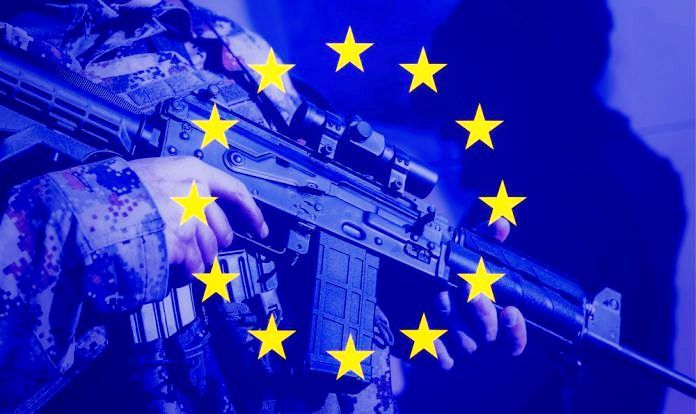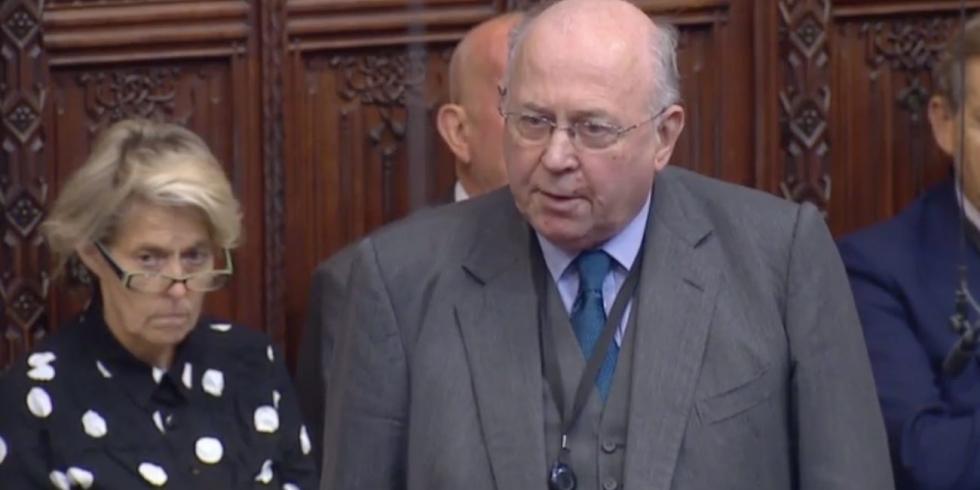Beware the threat to our defence autonomy coming from the EU Defence Union


Lt Gen Jonathon Riley CB DSO - September 5, 2019
Lieutenant-General Jonathon Riley CB DSO was deputy commander of the NATO-led ISAF force in Afghanistan. He also commanded British forces in Bosnia, Sierra Leone and Iraq and was awarded the NATO meritorious service medal. After leaving regular service, he has been a visiting professor in war studies and is an advisory board member of Veterans for Britain.
Earlier in the week, I and two colleagues from Veterans for Britain, Professor Gwythian Prins and Rear-Admiral Roger Lane-Nott, gave a briefing in Whitehall on the consequences for the UK if the defence and security sections of the current exit arrangements laid down in Theresa May’s Withdrawal Agreement and the Political Declaration are approved.
While the media overwhelmingly predicts negative consequences if Boris Johnson does not pass the EU’s one and only deal, defence is an area where there are clear and unparallelled dangers for the UK if he does. Three principal parts of the exit arrangements, contained in the Political Declaration, would immediately extinguish our defence autonomy and with it, one of the essential attributes of national sovereignty. We would be walking into a swamp from which it would be all but impossible to escape. Additionally, the legal knotweed which accompanies these three structures, which is scandalously given only a passing mention in the texts, makes the political burden and attachment even deeper.
Yet we are not even safe if we avoid the deal in the coming weeks. There is every risk that the Government could be led into these same defence arrangements under the guise of a trade deal, owing to the misplaced enthusiasm for these schemes among some members of the senior levels in the civil service. This has led to us being committed to at least seven levels of integration in EU defence structures that supersede and over-ride our national sovereignty. MPs have allowed this to continue or been duped; but sadly, few of them have taken an interest in the subject. Those who do take an interest have received bland reassurances from ministers, which usually carry the same wording regardless of which minister has sent it. In truth, how could MPs know in their own right how the EU Defence Union works and therefore the threat to autonomy that it presents? My colleagues and I took more than three months to piece it together while new linking structures were being announced on a gradual, staggered basis. This has meant working through more than a quarter of a million words across more than 15 texts and agreements.
I fear relatively few MPs have bothered to investigate how we are being sold out – and an even smaller number have spoken up in protest. It is the civil service and the political advisers who have been eager to accept the EU’s sales pitch and it is the same officials who have been free to frame ministerial advice on the subject. The result of this advice is that MPs think they are getting an à-la-carte buffet of defence, where the UK can breeze in and out as it pleases, with no obligations and only benefits. Nothing could be further from the truth. You would have thought 40 years of being told ‘no cherry-picking’ would have made MPs notice the hidden catch. The catch might have been noted, had Parliament scrutinised these measures as it should have done. A Scrutiny Reserve Regulation was put in place in 2010 to make sure this happened – but it has been repeatedly and deliberately breached.

Of course, the expanded political-military architecture of the EU comes with a broad and binding rulebook. You will struggle to find a Whitehall fan of EU Defence who is prepared to admit this. Most importantly, every part of EU Defence links to everything else. This detail is so poorly understood on our side of the Channel that EU spokespeople have taken turns to rebuke the UK for believing they can dip in when they choose without accepting EU terms.
Of course, it is not only MPs who have missed a trick. The UK’s news media have shown little interest and not even paid attention to the EU’s rebukes over policy links. The bottom line is that whatever exit deal we reach – including WTO rules – we have been enmeshed in a system that removes our sovereignty over defence and our defence forces. We can only take back control with an explicit statutory instrument that breaks this control from Brussels.
Are we a country, with all the attributes of statehood? Or are we simply a rule-taking colony of Brussels, happy to let our soldiers, sailors, airmen and marines be put in harm’s way by unelected officials who can never be called to account when things go wrong? It is a simple choice.
- Defence
- OpinionTags: Boris Johnson, European Defence Union, Gwythian Prins, Jonathon Riley, political declaration, Roger Lane-Nott, Scrutiny Reserve Regulation, sovereignty, Theresa May, Veterans for Britain, Withdrawal Agreement, WTO rules
READ ALSO:

WHO and WHAT is behind it all ? : >
The bottom line is for the people to regain their original, moral principles, which have intentionally been watered out over the past generations by our press, TV, and other media owned by the Illuminati/Bilderberger Group, corrupting our morals by making misbehavior acceptable to our society. Only in this way shall we conquer this oncoming wave of evil.
Commentary:
Norway have also agreed to the EU Defence Union tractate.
Administrator
All articles contained in Human-Synthesis are freely available and collected from the Internet. The interpretation of the contents is left to the readers and do not necessarily represent the views of the Administrator. Disclaimer: The contents of this article are of sole responsibility of the author(s). Human-Synthesis will not be responsible for any inaccurate or incorrect statement in this article. Human-Synthesis grants permission to cross-post original Human-Synthesis articles on community internet sites as long as the text & title are not modified.
The source and the author's copyright must be displayed. For publication of Human-Synthesis articles in print or other forms including commercial internet sites. Human-Synthesis contains copyrighted material the use of which has not always been specifically authorized by the copyright owner. We are making such material available to our readers under the provisions of "fair use" in an effort to advance a better understanding of political, economic and social issues. The material on this site is distributed without profit to those who have expressed a prior interest in receiving it for research and educational purposes. If you wish to use copyrighted material for purposes other than "fair use" you must request permission from the copyright owner.